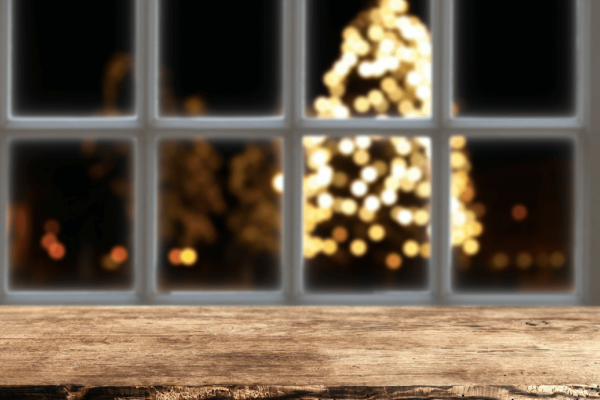It was about eight years ago now that I resigned myself to the fact that I was going to have to do the unthinkable. I had to get a Christmas tree. It was a bleak December: I had just moved to California and didn’t have much of a community yet. Retail jobs and lack of funds meant that my boyfriend and I weren’t going anywhere for the holidays, and we were having the kind of fight that lurked behind doors without ever really slamming them. I hated to admit it, but that insipid song was right; we needed a little Christmas. Bah humbug.
Something you learn very quickly when you’re one of only half a dozen Jews in your upstate New York public school: No one really believes you when you tell them you don’t celebrate Christmas. And watching my mom bring home yet another ornament from her office’s Secret Santa — I mean Secret Snowflake exchange — I knew this would be a lifelong affliction.
Even if they could accept how we spent the day itself (baking cookies, sledding, Chinese food and a movie) they would never truly understand that we did not have a Christmas tree. Not even a little one? No. What about a Hanukkah Bush? That’s not a thing. Well, they’re not really Christmasy. Yes, they are, that’s why they’re called Christmas trees. Well, actually, they were originally Pagan so … I’m not Pagan either. It’s really more of an American holiday, honestly … And that’s when I start to turn downright Grinchy.
A Christian holiday, which admittedly contains the fossil record of dozens of other traditions, does not magically become an American holiday simply by sheer force of overwhelming normalcy. And it definitely does not emerge on the other side as somehow less Christian than it was before. Despite the extremely vocal insistence of a few, America is not a Christian nation, and a Christmas tree should not be mistaken for the wintertime visage of the "Star-Spangled Banner."
Suffice to say that when I set out on my quest that day, I was unprepared. Mistake the first: It was December 23rd and the few trees left in the last open lots made Charlie Brown’s runted twig look lush as Santa’s beard. Mistake the second: I was driving a Honda Civic and didn’t bring so much as a yoga strap with me, let alone bungee cords or rope. Mistake the third: I somehow didn’t realize there would be follow-up questions. What kind of tree are you looking for? Um, green? How tall is your ceiling? Taller than me. What kind of stand do you have? I need a stand?
But what I was truly unprepared for was the staggering onslaught of social approval. I was surprising my boyfriend with a Christmas tree and the whole world wanted to help. Perfect strangers told me how sweet I was and reminisced about their own courtships of Christmases past. Everyone wanted to hear about our relationship. How did we meet? He cooks? He sounds like a keeper. Maybe a ring under that tree! I just kept nodding, incredulous, as if I’d stepped through an artfully frosted looking glass.
Something you learn very quickly when you’re the first out lesbian in your upstate New York public school: Public displays of affection can be a bit risky. This too, it turns out, is a lifelong affliction. In fact, just one year previous, I was sneaking a kiss in front of a display of candy canes, when a perfect stranger started yelling at me and my partner to stop being “so damn disgusting.”
See, this was before his top surgery, the testosterone injections, and the beard. This stranger had seen me and my pre-gender-transition partner, understandably, if incorrectly, as a lesbian couple being affectionate in public. As such, we were not welcome in her world and she seemed to have no reservations in telling us so. Just 12 miles away in San Francisco, the legendary drag queens of Beach Blanket Babylon were blowing kisses to an adoring crowd at their sold out Christmas Spectacular, but here in Oakland, my partner and I were getting a top volume tirade in public decency from a woman wearing Tweety Bird slippers in the “seasonal” aisle of Walgreens.
One year later, admonishments have turned to accolades, and all it took was one little word: boyfriend. And the tree of course. I arrived home at the end of my quest with an unfortunate Douglas fir bound and gagged across the backseat of the car, its poor crown hanging helplessly about a foot out the window. I had acquired a stand. I had remembered ornaments. I had lights. And I had to get it all up the two flights of stairs to my apartment. I’ve come too far to give up now, Douglas Fir; you better be worth it.
There were pine needles everywhere. They filled the car, the sidewalk, the steps, the living room, how were there any left on the tree? In a week, my parents were coming to visit, and my father, a staunch environmentalist known for his yearly rant on the wastefulness of Christmas tree farms mustn’t find them. But like Lady Macbeth, I would never be rid of them. They would haunt me. I would be found out for the traitor I was.
You know what has never caused me so much grief? A menorah. Even polishing the silver one from my great grandparents was a cakewalk compared to this. I vowed that I would never again complain about hot oil burns from making latkes. I would even pretend that dreidel was a fun game, if only I never had to deal with a Christmas tree again. This is a one-time thing, Douglas, got it?
Because here’s the thing about Hanukkah: It has nothing in common with Christmas except the time of year in which it is celebrated. Like so many Jewish holidays, the story of Hanukkah can be summarized as “They tried to kill us, we’re still here, let’s eat!” Only in this case, the “they” was also the “us.” The Maccabean revolt which Hanukkah celebrates, lasted from 167-160 B.C.E., when Antiochus IV Epiphanes, king of the Seleucid Empire tried to eradicate Judaism by making it illegal to study Torah or otherwise practice in public. Some Jews fled to the hills and continued to study Torah in caves, disguising the gatherings as gambling rings, which were more easily overlooked (possibly for a price) by patrolling soldiers. (That’s where the dreidels come in, by the way.) But other Jews were willing to give up their religious customs and embrace a more Grecian way of life. What followed was largely a civil war between assimilationist Jews and Maccabean rebels, until eventually, the Maccabees won, rededicated the temple, and relit the eternal flame, which burned for eight days on a single day’s supply of oil. When we celebrate Hanukkah, we remember that war, and light candles to say we’re still here. A menorah in the window is our refusal to blend into the background.
But sometimes it’s hard to make out a few small flames against the eye-searing carnival of Christmas lights. Just as sometimes, it’s hard to hold onto your identity as a queer woman when your partner transitions and suddenly the world sees you as straight. As a queer Jew, I never expected to see behind the door unlocked by sentences like, “I’m surprising my boyfriend with a Christmas tree” and once I saw it, I couldn’t help but be newly furious at how difficult we make life for anyone who doesn’t fit into the expected American “norms.” It shouldn’t be this hard just to live and love and celebrate. And it shouldn’t be this hard to get a tree into a stand.
When my partner finally came home, he found me in a full-on wrestling match with poor Douglas, cursing a blue streak, and covered in pine needles. He laughed so long and so loud I had no choice but to join in, and the fight we’d been having finally slunk out the door. We spent a lovely evening watching The Nightmare Before Christmas, drinking mulled wine, and decorating the tree with popcorn and cranberry strands, clove studded oranges, and paper snowflakes. We made Christmas, and it was beautiful. At one point, I remember looking down the street and seeing all the windows with their families and trees, and feeling bittersweet about ours looking the same as everyone else’s. But then I started to notice rainbow flags and the mezuzahs in our neighborhood, and the other windows with both Christmas trees and menorahs, and I felt less alone. Turns out, a little light can reach pretty far if you know where to look for it.
Got something to say about what you're reading? We value your feedback!







